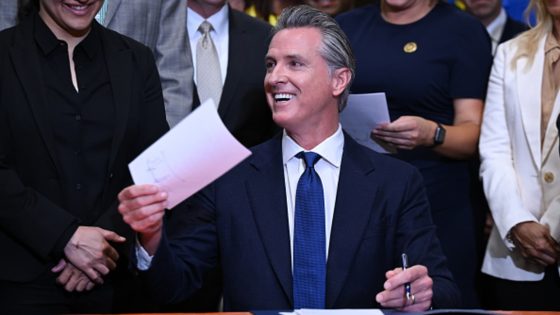California Democratic Gov. Gavin Newsom has signed 10 new bills into law that aim to combat retail crime in the state.
The package, announced Friday, includes new laws that crack down on shoplifting, theft from a vehicle, organized theft, and online marketplaces where these stolen goods are sometimes resold. The new laws come after retailers have called on both local and federal governments to do more to combat retail theft, citing it as a growing challenge that’s impacted profits, customers and staff.
One of the bills in the package, SB 1416, establishes tougher penalties for middlemen in organized retail crime rings and was introduced in response to a CNBC investigation published in March, according to the office of state Sen. Josh Newman, a Democrat, who introduced the bill.
That bill establishes additional prison time and fines for the sale, exchange or return of stolen property â the bread and butter of retail resale crime rings. Before to the law’s passage, those charged with being involved in organized retail crime rings could face up to three years in prison. Critics said that sentence and penalty were not enough of a deterrence.
Newman said the law was designed to go after middlemen like Michelle Mack â the organized retail crime “queenpin” who was exposed in CNBC’s investigation. Police say she made millions reselling stolen goods on Amazon at a fraction of their typical retail price. Mack was arrested in December and received a delayed sentence of five years and four months in state prison.
Mack’s husband, Kenneth, received the same sentence and is already incarcerated. The couple was ordered to pay about $3 million in restitution to beauty retailer Ulta and another $13,000 to Sephora, a court official previously told CNBC.
Theft and organized retail crime rings like that of Mack’s “California Girls” have been cited by retailers as a reason for lower profits, difficulty in hiring and retaining staff, and the degradation of the in-store experience. Others have countered these claims, saying that retailers are overstating the impact of theft and downplaying the operational issues behind lower profits.
Commercial burglary and commercial robbery rates in California have been steadily rising over the past few years, according to data from the Public Policy Institute of California. Shoplifting, although still well below pre-pandemic levels, is seeing an increase as well.
Since January, the California Highway Patrol’s Organized Retail Crime Task Force has made 884 arrests and recovered more than 250,000 stolen items valued collectively at over $7.2 million, according to the press release announcing the new legislation.
Retailers have been urging Congress to crack down on organized retail crime nationally, with the retail lobby group National Retail Federation pushing to make it easier to prosecute theft as a federal felony.
With the 2024 presidential election looming, Democrats are also looking to appear tough on crime to address Republican criticism of the nation’s rising crime rates. However, critics of the push to combat retail crime fear the measures may disproportionately harm marginalized groups.
Another bill, SB 1144, also passed in the new package of laws aims to prevent the trafficking of stolen goods on online marketplaces like Amazon. The bill, introduced by state Sen. Nancy Skinner, a Democrat, builds on a previous California law by updating compliance criteria for high-volume, third-party sellers and making it easier for civil charges to be filed against online marketplaces selling stolen goods, among other measures.
â CNBC’s Gabrielle Fonrouge, Scott Zamost and Courtney Reagan contributed to this report.
Source Agencies

